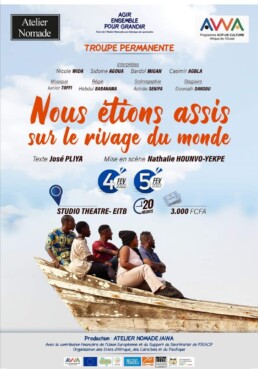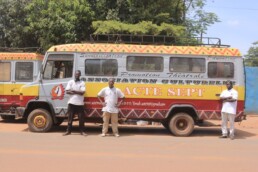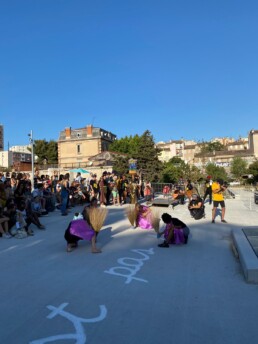"Agir ensemble pour grandir"
The Atelier Nomade houses the École Internationale de Théâtre du Bénin as well as several performance spaces, regular venues for Beninese, Togolese, Burkinabe and Nigerian artists. In addition to the establishment of a permanent, multi-purpose troupe of some twenty talents (directors, actors, dancers, puppeteers, circus artists, etc.), the consolidation and expansion project "Agir ensemble pour grandir " includes the creation of a museum of the performing arts. By working on the synergy between 9 sub-regional theatres (6 in Benin, 1 in Togo, 1 in Niger and 1 in Burkina Faso) and the networking of their cultural content, the project intends to take advantage of the income and move towards financial autonomy, a key objective for true anchoring and sustainability.
A look at planned productions
- creation of a permanent troupe
- opening 12 small format residences and 2 large format residences
- development of a network of cultural operators from 4 neighbouring countries
- creation of a digital platform and an online ticketing service with payment of tickets by telephone
- regular animation of the three stages of the Atelier Nomade
- creation and monetisation of a performing arts museum
Focus on Atelier Nomade
Atelier Nomade opened its doors in 1992. It is now home to the École Internationale de Théâtre du Bénin, a higher education institution that prepares students for a state diploma. The two pillars of its mission are professional training and artistic creation, which enable the cultural and artistic education of young people and local communities. The theatre school often works on themes that contribute to human development and good citizenship.
"Maremusica", production and distribution of music from Cape Verde
Highly impacted by the Covid-19 pandemic, the Cape Verdean cultural industry, and even more so its independent music industry, is in danger of disappearing. To save this popular heritage, Maremusica proposes to revive traditional music in Cape Verde by relocating the entire production chain to the archipelago. From identifying new talent to the creation of labels, including the opening of recording studios and the organisation of tours, this project involves the creation of around a hundred jobs (musicians, technicians, communication, digital, etc.) and guarantees the safeguarding and revival of the popular treasure that is Cape Verdean music.
A look at planned productions
- Production of 3 albums: an established artist in the Cape Verdean musical tradition; and two young talents, male and female
- Production of a major work of traditional Cape Verdean music (Mornas) with the Symphony Orchestra of the Calouste Gulbenkian Foundation, from Portugal
- Creation of digital platforms and uploading and monetising online content
- Creating jobs in the sector and ensuring income for artists and their families
- Attracting new investors
Focus on Maremusica, Produção, edição e distribuição musical
Founded in 2016 by musician and writer Mario Lucio, former Cape Verdean Minister of Culture, Maremusica's main objective is the creative and financial independence of Cape Verdean artists, the protection of traditional music and the discovery of new talent.
"La NEUF", training, creation and production
The Malian cultural industry offers a plethora of stakeholders but is cruelly lacking in scriptwriters, costume designers and other entertainment professionals without whom works cannot exist. In response to this shortage, "La NEUF" (Nouvelle École Usine et de Formation) offers a system of training, both face-to-face and at a distance, including workshops, masterclasses and internships for dialogue with professionals. This proposal for training in the performing arts will ultimately lead to the creation of new shows to be presented during a tour of 8 cities, already established by the association. Acte SEPT also intends to involve communities in order to establish a sustainable and culturally endogenous funding mechanism, a factor in sustainable development.
A look at planned productions
- Creation of a digital platform for training
- Establishment of 16 workshops on the performing arts professions
- Creation of 8 plays
- Distribution of the 8 plays in the 8 cities of the Sirabo network
- Creation of a partner network
- Organisation of a festival
Focus on Acte SEPT
According to Acte SEPT, the project leader, "everyone must be able to participate in the cultural life of their choice and exercise their own cultural practices within the limits imposed by respect for human rights and fundamental freedoms. " Driven by this vision, the association has been working in Bamako since 1994 and has been moving to the rhythm of its Festival du Théâtre des Réalités since 1996.
« Consolidation de l'industrie Théâtrale en Afrique de l’Ouest » (CITAO)
The ICAO initiative aims to consolidate the existing collaboration between the Espace Culturel Gambidi (ECG) and its national and international partners. It is also a question of reinforcing previously established cultural actions such as the "Route des Arts" or the famous International Theatre and Puppet Festival of Ouagadougou (FITMO) now held in 6 West African countries. With the help of marketing plans and digital tools, ICAO seeks to involve young people more, encourage a wider distribution of works and generate more revenue that will allow it to perpetuate its theatrical activity.
Overview of expected productions
- training of 60 cultural operators
- creation of a web platform dedicated to the communication and marketing of content from the West African theatre sector
- production of a video documentary on the capitalisation and sharing of the project's experiences and good practices
Focus on Espace Culturel Gambidi
Born from the determination of the artists of the Théâtre de la Fraternité (a famous troupe in Burkina Faso) to have a headquarters that would be both a space for rehearsal and creation, the Espace Culturel Gambidi brings together a number of organisations including: The Centre de Formation et de Recherche en Arts Vivants (CFRAV), the Atelier International des Arts Plastiques (AIAP), the first exclusively cultural private radio station in Burkina Faso, a Media Library, a 500-seat theatre and a guest house.
"ELAN", Art of storytelling and recital
Tales, myths, initiation stories, legends and other oral poetry exist to tell and be told. These oral works convey the language, modes of thought, habits and customs specific to each people. It is with the aim of giving new impetus to this ancient cultural heritage, recognised as "intangible heritage" by UNESCO, that the ELAN project has taken shape. By respecting parity and relying on the solid relationships already established by the Naforo-Ba Company with 8 West African countries, ELAN aims to accompany 16 storytelling artists from the 8 partner countries throughout the production cycle.
Overview of expected productions
- 80 diverse stories collected at a rate of 5 stories per Artist in a perspective of contemporary exploitation
- 5 collections of 16 illustrated stories, produced in the "Ziri Collection" and printed at 5,000 copies each for retail
- contribution of 8 Illustrators (1 per country) to the above mentioned collections
- 3 capacity building workshops for stakeholders in the storytelling sector organised over 3 years (1 per year)
- production of 80 audio tales made available for digital downloading and listening platforms for a fee
- production of 80 brief audio tales or proverbs, to be broadcast on telephones by the mobile network operators in the 8 countries of the action
- participation in the Nuit du Conte en Famille (NCF) organised each year as both a live and a ticketed online event
Focus on the Naforo-Ba company
The Naforo-Ba Company was founded in 2000 in Abidjan (Côte d'Ivoire) with the aim of promoting African oral literature, both ancient and contemporary, and to promote its knowledge and practice. With extensive experience, the association of professionals has been able to forge special links with Burkina Faso, Benin, Niger, Mali, Togo, Guinea and Senegal.
"De l'Homme vers l'Homme", contemporary dance
Specialised in the field of contemporary dance, the Don Sen Folo association anchors its project in the transmission and dialogue between ancient traditions and contemporary gestures. Its distribution in public spaces increases the visibility of the artists' work among the public and local authorities, and is also a good way of getting around the difficulties of distribution in traditional infrastructures, the networks for which are often lacking in this region. In order to improve the production of African dancers and choreographers and to promote this art form at national and continental level, "De l'Homme vers l'Homme" will focus on strengthening artistic skills, activating South-South cooperation, and setting up an African network for contemporary dance in public spaces.
A look at planned productions
- Training of 14 young artists in dance and choreography
- Choreographic residencies in public spaces (2 months) involving 32 artists
- Presentation of the artists and their work in the online catalogues of the residencies and on the Numéridanse TV website
- Production, recording and broadcasting of contemporary choreographic works in public spaces
- Production of a "Guide to good practice in contemporary dance in public spaces in Mali".
Focus on Don Sen Folo
The Don Sen Folo association has been working since 2010 on the issue of access to culture, formerly in the Kalaban Coro district of Bamako and currently in the rural commune of Bancoumana. With the firm belief that Art and Culture can become the economic engines of tomorrow's society, the association works to make the work of artists known and understood by the population.
"Afropolis", virtual performance space
The idea of this organised virtual performance space was born out of the pandemic. In April 2020, the annual "DanceGATHERING" dance event was threatened by the Covid crisis. Instead of cancelling it, the association decides to maintain it in a virtual edition. The event was a resounding success, with 10,000 visitors from 300 cities around the world. Consequently, the "Afropolis" project has become a reference platform for Afro urban culture and a resource centre for educational and creative content from various backgrounds. This digital artistic offering that defies distance, reduces its carbon footprint, aims to broaden its audience and increase interactivity, also functions as a laboratory where the performing arts are combined to create new cultures.
Overview of expected productions
- Registering over 100,000 subscribers
- Reach new digital audiences and generate new interest in creative works online
- To have significant growth in the creative community
- Facilitate access to creative and cultural content regionally and internationally
- Encourage participation in the creation of new cultures regionally and internationally
Focus on Creative Culture Support Foundation
A genuine creative incubator, this association acts as a arts and innovation skills factory. Creative Culture Support Foundation is a committed organisation that has become a recognised driving force in the Nigerian creative scene over the years.








